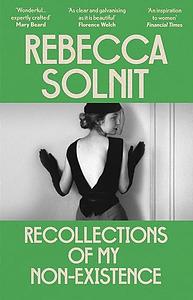Take a photo of a barcode or cover
This may be my year of reading Rebecca Solnit. This is my 3rd book this year and by far, my favorite at this point. A memoir, Solnit recounts her nonexistence in a culture that doesn't value women, women writers, and women thinkers. I can't imagine there are any women who have not had at least one of the experiences she describes as men and cultural forces attempt to ignore, deny, disregard, argue, and explain things. She extends through the intersectionality of nonexistence and degradation.
An important book to read as we watch women, queers, and people of color continue to lose their voices, their presence, their influence, and their rights in a culture dominated by white men.
An important book to read as we watch women, queers, and people of color continue to lose their voices, their presence, their influence, and their rights in a culture dominated by white men.
I have rarely felt more seen by a book.
The things Solnit writes about being a woman, about reading, and about writing itself were revelatory to me. It’s like she has invented language for things I have felt but never knew how to name. Or no — language for things I have felt but rarely dwelled on, because they seemed so commonplace.
It would be like dwelling on the fact that the sun rises every morning — so normal that I’d never think twice about it, let alone think of exploring it further.
But Solnit book shows that all these things do matter: naming the unnameable, probing into seemingly commonplace and wildly obscure topics alike, just because it matters to you, as a person. And then, by extension, it might matter to someone else when it is written down.
I purposely slowed down towards the end of this book because I didn’t want it to end.
Now I’ll have to read everything else she’s written.
"I wanted urgency, intensity, excess and extremes, prose and narrative bursting against the confines. Except when I wanted reassurances. I found both. I lived so deeply in books that I fet unanchored an adrift, not particularly part of my own time and place, always with one foot or more in other places, medieval or imaginary or Edwardian. I had in that floating world a sense that I might wake up or otherwise find myself in one of those other times and places" (108).
The things Solnit writes about being a woman, about reading, and about writing itself were revelatory to me. It’s like she has invented language for things I have felt but never knew how to name. Or no — language for things I have felt but rarely dwelled on, because they seemed so commonplace.
It would be like dwelling on the fact that the sun rises every morning — so normal that I’d never think twice about it, let alone think of exploring it further.
But Solnit book shows that all these things do matter: naming the unnameable, probing into seemingly commonplace and wildly obscure topics alike, just because it matters to you, as a person. And then, by extension, it might matter to someone else when it is written down.
I purposely slowed down towards the end of this book because I didn’t want it to end.
Now I’ll have to read everything else she’s written.
"I wanted urgency, intensity, excess and extremes, prose and narrative bursting against the confines. Except when I wanted reassurances. I found both. I lived so deeply in books that I fet unanchored an adrift, not particularly part of my own time and place, always with one foot or more in other places, medieval or imaginary or Edwardian. I had in that floating world a sense that I might wake up or otherwise find myself in one of those other times and places" (108).
I will always pick up the new Solnit book. This memoir displays both breadth and depth, effortlessly connecting her experiences and memories with human issues, delving into racism, classism, misogyny, and more unflinchingly. But the deepest hurt and the hottest rage are combined with tender reminders of the good that people are capable of, the connections that remind her and us of how we touch each other’s lives, and there is hope.
challenging
emotional
informative
reflective
medium-paced
It is so inspiring to know that someone who uses her voices is speaking for myself and many other women and others whose voices are usually not heard.
More clearheaded, strong writing from one of the important feminist voices of our times. As I am close to Solnit's age I could relate to many of the tales told in a way a younger reader might not, though there are plenty of nods to more current times as well. Some of Solnit's passages are so perfect they take my breath away (as does the cover picture, which she explains in the book).
well.
i feel the way about Solnit as i feel about most White Feminism.
Laser focused on the particular flavor of abject misogyny that any resolute woman will suffer, but misses how racial identity is more than a rich and sentimental backdrop to her personal story of economic freedom, fighting for agency.
I did enjoy some descriptions of the san francisco I also knew.
i feel the way about Solnit as i feel about most White Feminism.
Laser focused on the particular flavor of abject misogyny that any resolute woman will suffer, but misses how racial identity is more than a rich and sentimental backdrop to her personal story of economic freedom, fighting for agency.
I did enjoy some descriptions of the san francisco I also knew.
inspiring
reflective
slow-paced


